
We understand the need to choose the best materials for your outdoor water fountain, and we are here to help you make an informed decision that can bring you joy for years to come. In this article, we will provide you with comprehensive information about different materials that are available for outdoor water fountains, and their pros and cons. Our goal is to equip you with the necessary knowledge that can help you choose the best material for your specific needs.

Stone
Stone is a popular material for outdoor water fountains due to its durability and natural look. There are different types of stones available for fountains, such as granite, marble, and slate.
Granite
Granite is a dense and durable stone that can withstand extreme weather conditions, making it an ideal material for outdoor water fountains. It's available in a wide range of colors, from light to dark, and can be polished for a sleek finish or left unpolished for a more natural look.
Pros:
Durability: Granite is one of the most durable materials available for water fountains. It is a hard, dense stone that can withstand the elements and is resistant to chipping, cracking, and fading.
Low maintenance: Granite is relatively low maintenance compared to other types of stone fountains. It does not require sealing or polishing, and can be cleaned with mild soap and water.
Cons:
Heavy weight: Granite is a dense and heavy material, which can make it difficult to move and install. This can also increase shipping costs if the fountain needs to be transported a long distance.
Limited customization: Granite is a natural stone, and while it is available in a range of colors and patterns, it may not offer the same level of customization as other materials. It can also be difficult to carve or shape, limiting the types of designs that can be created.
Marble
Marble is a beautiful and elegant stone that adds a touch of luxury to outdoor water fountains. It has a smooth and polished surface, making it easy to clean and maintain. However, it's important to note that marble is a porous material and can be prone to staining if not properly sealed.
Pros:
Elegant appearance: Marble is a classic and elegant material that can give water fountains a refined and sophisticated look. It has a smooth, polished surface that can reflect light and add a sense of luxury to outdoor spaces.
Variety: Marble is available in a wide range of colors and patterns, giving fountain owners a great deal of options when it comes to customization. It can also be easily carved and shaped to create intricate designs and features.
Cons:
Cost: Marble is a relatively expensive material, which can make it less accessible for some fountain owners. The cost can be driven up further by the skilled labor required to shape and carve the stone.
Maintenance: Marble is a porous material, which means that it can absorb water and other liquids. This can make it prone to staining or discoloration over time. Regular cleaning and sealing is necessary to keep marble fountains looking their best.
Slate
Slate is a durable and water-resistant stone that's available in a range of natural earthy colors, such as brown, gray, and green. It's ideal for creating a natural look in outdoor water fountains and is known for its unique texture and grain pattern.
Pros:
Unique look: Slate is a metamorphic rock that often features a unique, layered appearance. This can give slate fountains a striking and distinctive look that sets them apart from other types of stone fountains.
Versatility: Slate is available in a wide range of colors and patterns, allowing for a great deal of customization in terms of fountain design. It can also be easily cut and shaped to create intricate designs and features.
Cons:
Fragility: While slate is a durable material, it can be prone to cracking or chipping if not handled carefully. This can be especially problematic for larger fountains or those that are frequently moved or adjusted.
Maintenance: Slate is a porous material, which means that it can be prone to staining or discoloration if not properly sealed. It also requires regular cleaning and maintenance to keep it looking its best over time.
Sandstone
Sandstone is a sedimentary rock that is made up of sand-sized grains of mineral, rock, or organic material. It comes in a range of colors, including red, brown, and yellow, and is known for its durability and natural look.
Pros:
Natural look: Sandstone has a unique, natural appearance that can blend in well with outdoor landscapes. It has a grainy texture and often features subtle variations in color, making each fountain one-of-a-kind.
Durability: Sandstone is a dense, durable material that is able to withstand exposure to the elements. It is resistant to weathering and erosion, making it a great choice for outdoor fountains.
Cons:
Porosity: Sandstone is a porous material, which means that it can absorb water and other liquids. This can lead to issues with staining or discoloration over time, especially if the fountain is not properly sealed.
Maintenance: While sandstone fountains are generally low maintenance, they do require some upkeep to keep them looking their best. This may include regular cleaning and sealing, as well as occasional repairs to address cracks or chips in the stone.
Resin
Resin is a synthetic material that is commonly used for outdoor water fountains. It is a versatile material that can be shaped into any form or pattern. Resin fountains can mimic the look of stone, metal, or wood, and they are lightweight and easy to move. There are different types available for fountains including fiberglass, polyresin, and resin stone.
Fiberglass
Fiberglass resin fountains are a popular choice for those seeking a lightweight, versatile, and durable water fountain for their outdoor space. These fountains are designed to mimic the look and feel of natural stone, while also offering the benefits of a modern, synthetic material.
Pros:
Lightweight: Fiberglass resin fountains are one of the lightest types of water fountains available. This makes them easier to move and install, and reduces the risk of damage during transport or installation.
Versatile: Fiberglass resin can be easily molded into different shapes and designs, making it a versatile material for water fountains. This means that fiberglass resin fountains can be found in a wide range of styles and sizes, and can be customized to fit a variety of settings and preferences.
Cons:
Vulnerable to fading: Fiberglass resin fountains are vulnerable to fading over time, especially when exposed to direct sunlight. This means that they may require more maintenance than some other types of water fountains to keep their color and finish looking fresh and new.
Vulnerable to cracking: While fiberglass resin is generally a durable material, it is not as strong as some other types of stone or resin fountains. This means that fiberglass resin fountains may be vulnerable to cracking or other types of damage if they are exposed to extreme weather conditions or rough handling.
Polyresin
Polyresin fountains are a popular and affordable choice for those seeking a lightweight and durable water fountain that mimics the look and feel of natural stone. Made from a combination of polyester resin and stone particles, these fountains offer a high level of detail and can be shaped into a wide range of designs and styles.
Pros:
Lightweight: Polyresin fountains are lightweight and easy to move around, making them a good choice for those who like to change the layout of their outdoor space frequently.
Versatile: Polyresin fountains can be designed to mimic the look and feel of natural stone, wood, or metal, providing a wide range of options for those who are seeking a particular aesthetic.
Cons:
Durability: Not as durable as stone fountains, and may be prone to cracking or fading over time.
Maintenance: May require more maintenance than other types of fountains, as they may be more prone to algae growth or discoloration.
Resin Stone
Resin stone fountains are a popular choice for outdoor water fountains because they offer the look and feel of natural stone without the added weight and expense. Made from a combination of real stone and a resin material, these fountains are lightweight, durable, and come in a variety of styles and sizes.
Pros:
Lightweight: Resin stone fountains are much lighter than their natural stone counterparts, making them easier to move and install. This can be especially beneficial for larger fountains that would be difficult or impractical to install using real stone.
Versatile: Resin stone fountains can be made in a variety of shapes, sizes, and styles, allowing for a greater range of customization options. They can also be finished in a variety of colors and textures, allowing them to mimic the look of real stone, concrete, or other materials.
Cons:
Not as Durable as Real Stone: While resin stone fountains are durable and long-lasting, they may not be as durable as a fountain made entirely of natural stone. They may be more susceptible to wear and tear over time, especially if they are exposed to harsh weather conditions or frequent use.
Can be Expensive: Although resin stone fountains are often less expensive than natural stone fountains, they can still be relatively expensive when compared to other materials like polyresin or fiberglass. This may be a consideration for those on a tight budget.
Ceramic
Ceramic fountains are an excellent choice for those who want to add a touch of elegance and style to their outdoor space. Ceramic fountains are known for their intricate designs, vivid colors, and unique textures, making them a popular choice for many homeowners. There are different types of ceramic available for fountains, such as glazed, terra cotta, and porcelain.
Glazed
These fountains are coated with a layer of glaze that gives them a glossy and smooth finish.
Pros:
Variety of designs: Glazed ceramic fountains come in a variety of designs, colors, and patterns, making it easy to find one that matches your personal taste and decor.
Water-resistant: Glazed ceramic fountains have a smooth and non-porous surface which makes them water-resistant, preventing damage from the constant contact with water.
Cons:
Fragile: Glazed ceramic fountains can be fragile and are prone to breaking, chipping or cracking if they are accidentally knocked over or exposed to extreme temperatures.
High maintenance: Glazed ceramic fountains require regular cleaning and maintenance to keep them looking good and functioning properly, especially in areas with hard water that can cause mineral buildup.
Terra cotta
Terra cotta is a type of clay that is commonly used in pottery and ceramics. Terra cotta ceramic fountains have a more natural and rustic look compared to glazed ceramic fountains. They're usually unglazed, which gives them a matte finish and a warm, earthy tone.
Pros:
Natural look and feel: Terra cotta ceramic fountains have an earthy and natural appearance, which can add a rustic charm to any outdoor space.
Porosity: Terra cotta ceramic is a porous material, which means that it is good at absorbing water. This makes it an ideal material for fountains, as it can hold and retain water for longer periods of time.
Cons:
Fragility: While terra cotta is a durable material, it is still quite fragile and can break or crack easily, especially in extreme weather conditions.
High maintenance: Terra cotta ceramic fountains require regular maintenance to keep them clean and prevent the growth of mold or mildew. They also need to be protected from freezing temperatures in the winter.
Porcelain
Porcelain is a type of ceramic that is fired at a high temperature, resulting in a hard, non-porous material. Porcelain ceramic fountains are known for their smooth and delicate texture, making them a popular choice for those who want a more refined and elegant look.
Pros:
Durability: Porcelain is a durable material that can withstand exposure to the elements without fading, cracking or chipping easily.
Aesthetic appeal: Porcelain ceramic fountains can add an elegant and sophisticated look to your outdoor space. They come in a range of colors, patterns, and designs that can enhance the visual appeal of your garden or patio.
Cons:
Fragility: While porcelain is durable, it can be fragile and is prone to cracking if subjected to significant impact or pressure. This makes it more difficult to move and transport than other materials.
Cost: Porcelain is generally more expensive than other materials used to make fountains. This is due to the high cost of raw materials and the skill required to shape and glaze the porcelain. As a result, porcelain fountains may not be a suitable choice for those on a tight budget.
Metal
Metal fountains are a popular decorative feature in outdoor and indoor spaces. They are often crafted from durable metals such as stainless steel, copper, or bronze, and can range in size from small tabletop pieces to large, elaborate installations. Metal fountains can add elegance, tranquillity, and a sense of relaxation to any environment. There are different types of metals available for fountains, such as stainless steel, copper, and bronze.
Stainless steel
Stainless steel water fountains are modern, durable, and low maintenance. They come in various sizes and designs, are easy to clean, and have energy-efficient pumps and lighting.
Pros:
Durability: Stainless steel water fountains are corrosion-resistant, making them highly durable and long-lasting.
Low maintenance: These fountains require minimal maintenance, as stainless steel is easy to clean and maintain its appearance over time.
Cons:
Cost: Stainless steel fountains can be more expensive than other types of metal fountains due to the higher cost of materials and manufacturing.
Heat retention: Stainless steel has high thermal conductivity, which means that it can retain heat from the sun, potentially making the water in the fountain warmer than desired.
Copper
Copper is a soft and malleable metal that can be easily crafted into intricate designs, making it a popular material for creating water fountains.
Pros:
Aesthetic appeal: Copper water fountains have a unique appearance and create a warm, inviting ambiance. The patina on copper fountains gives them an antique and weathered look, which can add a touch of charm to any space.
Durability: Copper is a durable and long-lasting material that can withstand exposure to the elements without rusting or corroding, making it a practical choice for outdoor installations.
Cons:
Cost: Copper water fountains can be more expensive than other types of metal fountains due to the higher cost of materials and the time required to craft intricate designs.
Maintenance: Copper fountains require more maintenance than other materials, as they can develop water stains and require occasional polishing to maintain their appearance.
Bronze
Bronze is a copper-based alloy that is highly durable and corrosion-resistant, making it a popular material for creating outdoor water fountains.
Pros:
Durability: Bronze is a highly durable material that can withstand exposure to the elements without rusting or corroding, making it ideal for outdoor water fountains.
Aesthetic appeal: Bronze water fountains have an elegant and sophisticated look that can add a touch of class to any environment. The intricate designs and various patinas available can create a wide range of styles and aesthetics.
Cons:
Cost: Bronze water fountains can be more expensive than other types of metal fountains due to the higher cost of materials and the time required to craft intricate designs.
Maintenance: Bronze fountains require more maintenance than other materials, as they can develop water stains and require occasional polishing to maintain their appearance. Additionally, the patina on the bronze may change over time, requiring periodic maintenance to keep it looking as desired.
Concrete
Made from a composite material of cement, aggregates, and water, these fountains are often molded into various shapes and sizes, from small tabletop designs to large, multi-tiered installations. They come in various styles and finishes, ranging from traditional to modern.
Aggregates refer to the materials used in concrete water fountains, which typically include sand, gravel, or crushed stone mixed with cement and water. The aggregates are what provide the bulk and texture to the concrete mixture.
Pros:
Durability: Concrete water fountains are durable and can withstand exposure to the elements without cracking or fading. They can be a long-lasting addition to any outdoor or indoor space.Versatility: Concrete water fountains come in a variety of designs and finishes, from simple modern designs to more intricate and traditional styles. They can be customized to suit any environment and can be used as a focal point in any landscape.
Cons:
Heavy: Concrete water fountains can be quite heavy, which may make them difficult to move or adjust once installed. This can also make installation more difficult.
Maintenance: Concrete water fountains can require more maintenance than other types of fountains. The concrete material can absorb stains and dirt, which can make them more difficult to clean and maintain. Over time, the fountain may require sealing or refinishing to keep it looking its best.
Final Thoughts
Choosing the right material for your outdoor water fountain is crucial for ensuring its longevity and your satisfaction with its aesthetic appeal. By providing comprehensive information about different materials and their advantages and disadvantages, we hope to empower you to make an informed decision that brings you joy for years to come.
Related Articles
Concrete Water Fountains- a Comprehensive Guide
From Quarry to Garden: The Journey of Limestone Water Features
Why Limestone Makes for Perfect Water Features
Why Stainless Steel? The Durability and Longevity of Steel Water Fountains
Guide on Tiered Water Fountains
How to Choose the Right Water Feature


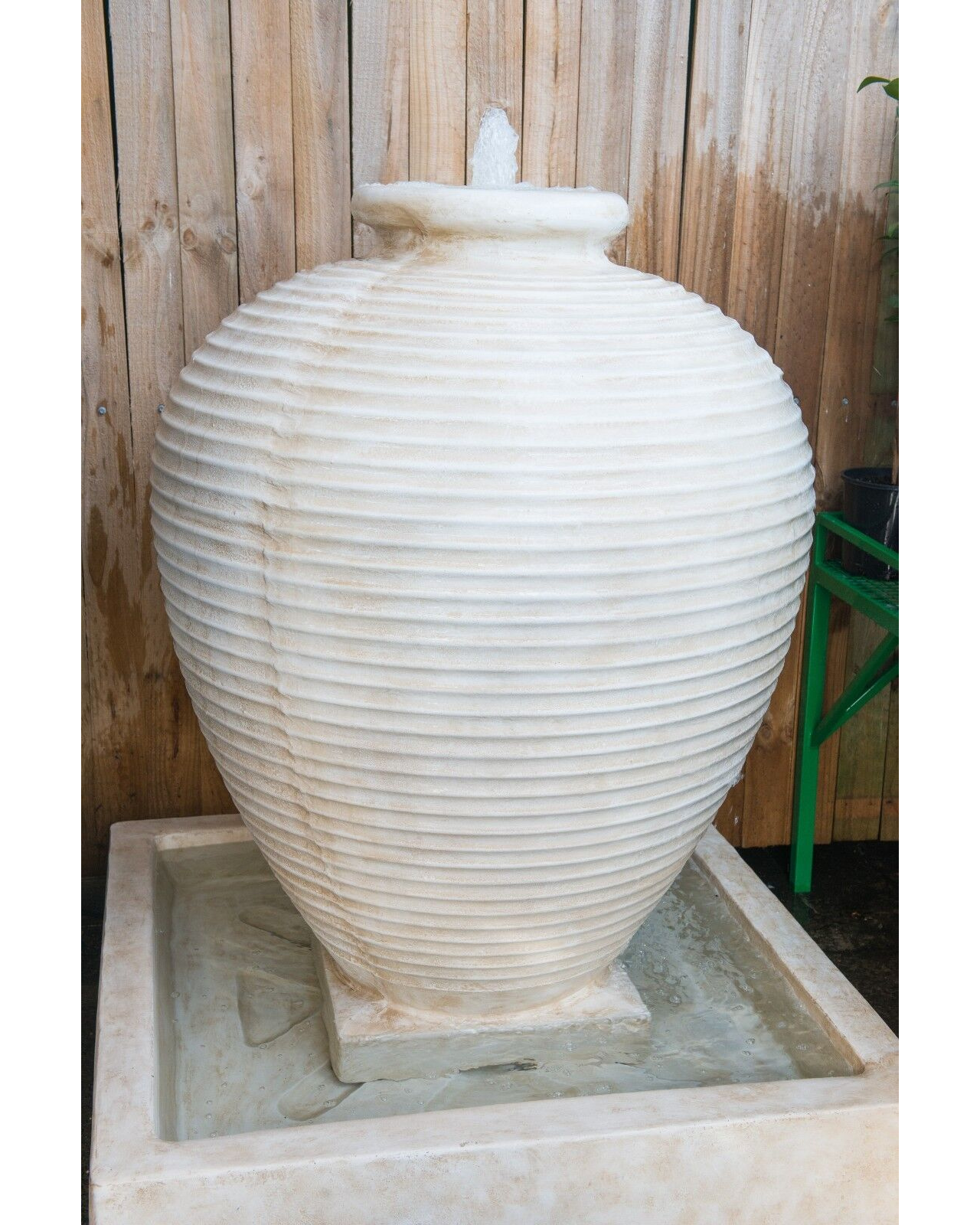

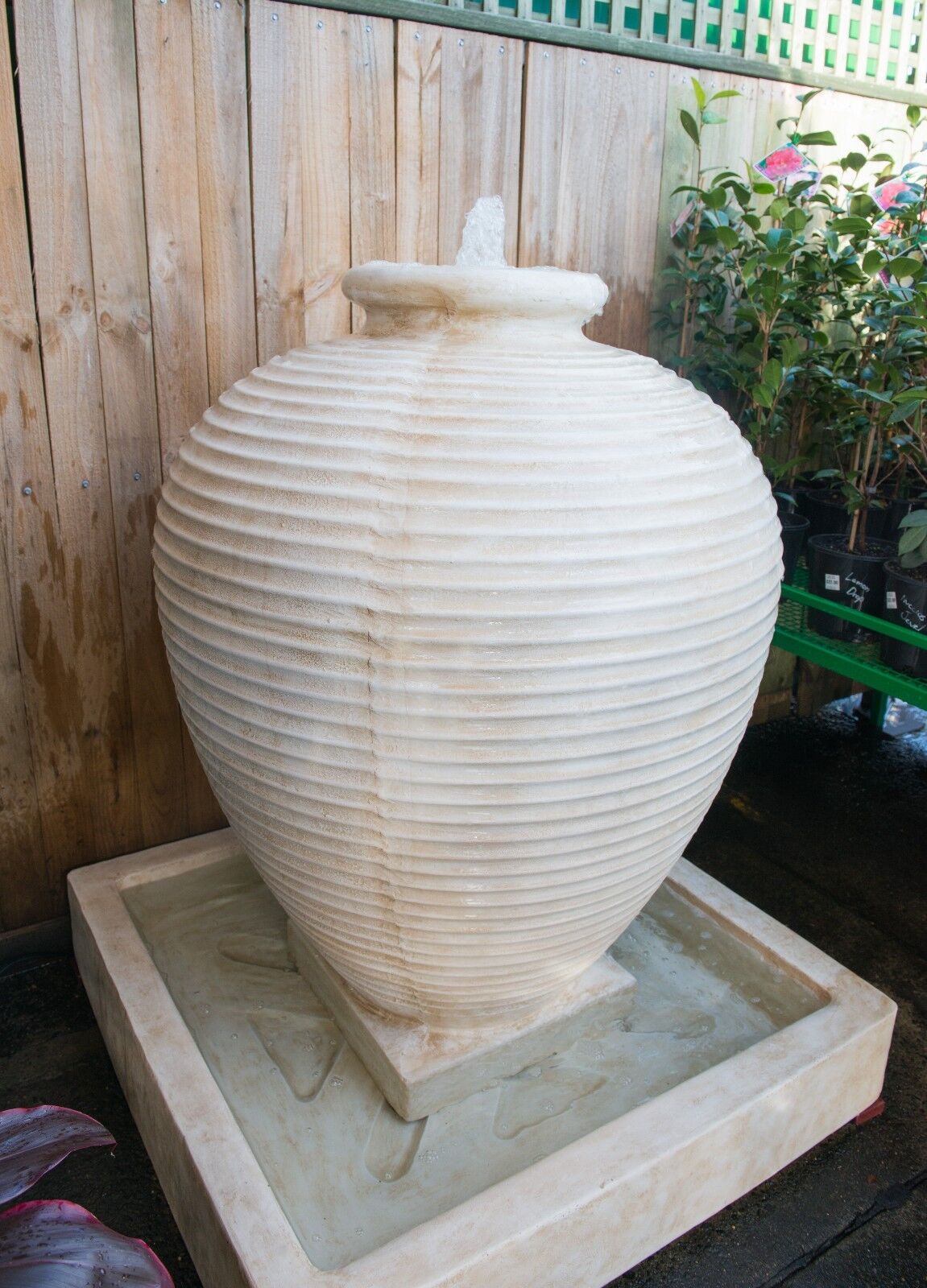
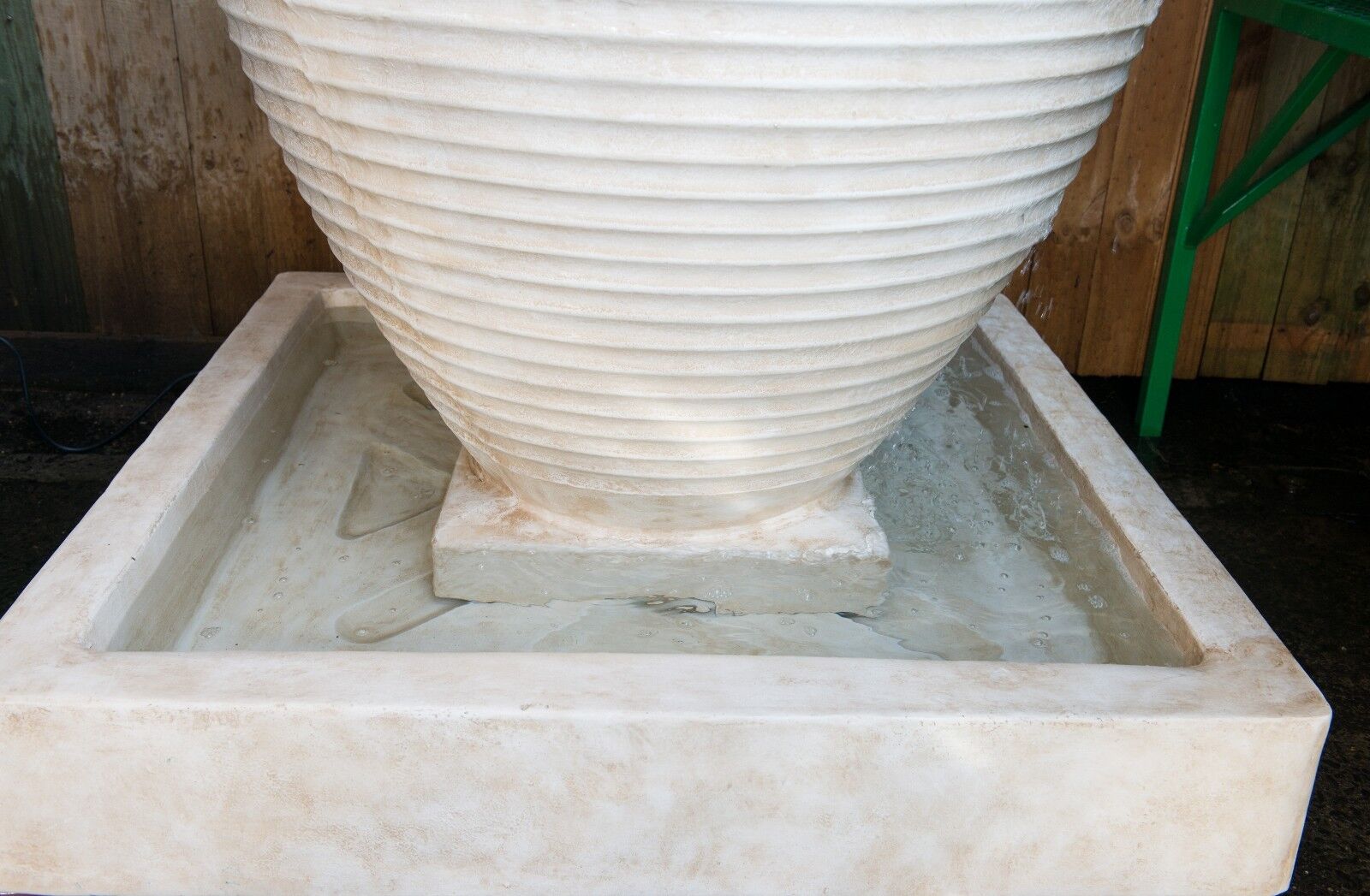
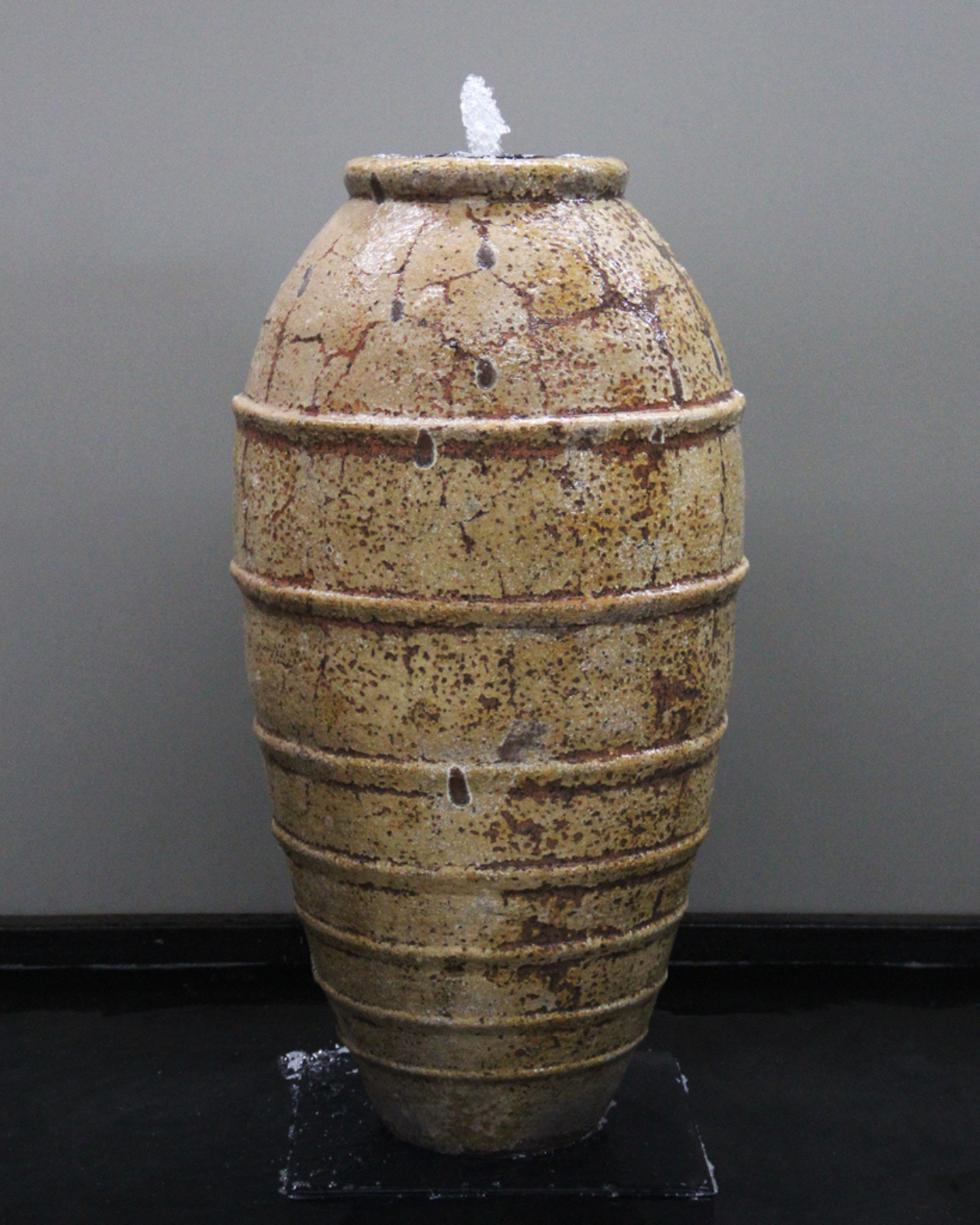

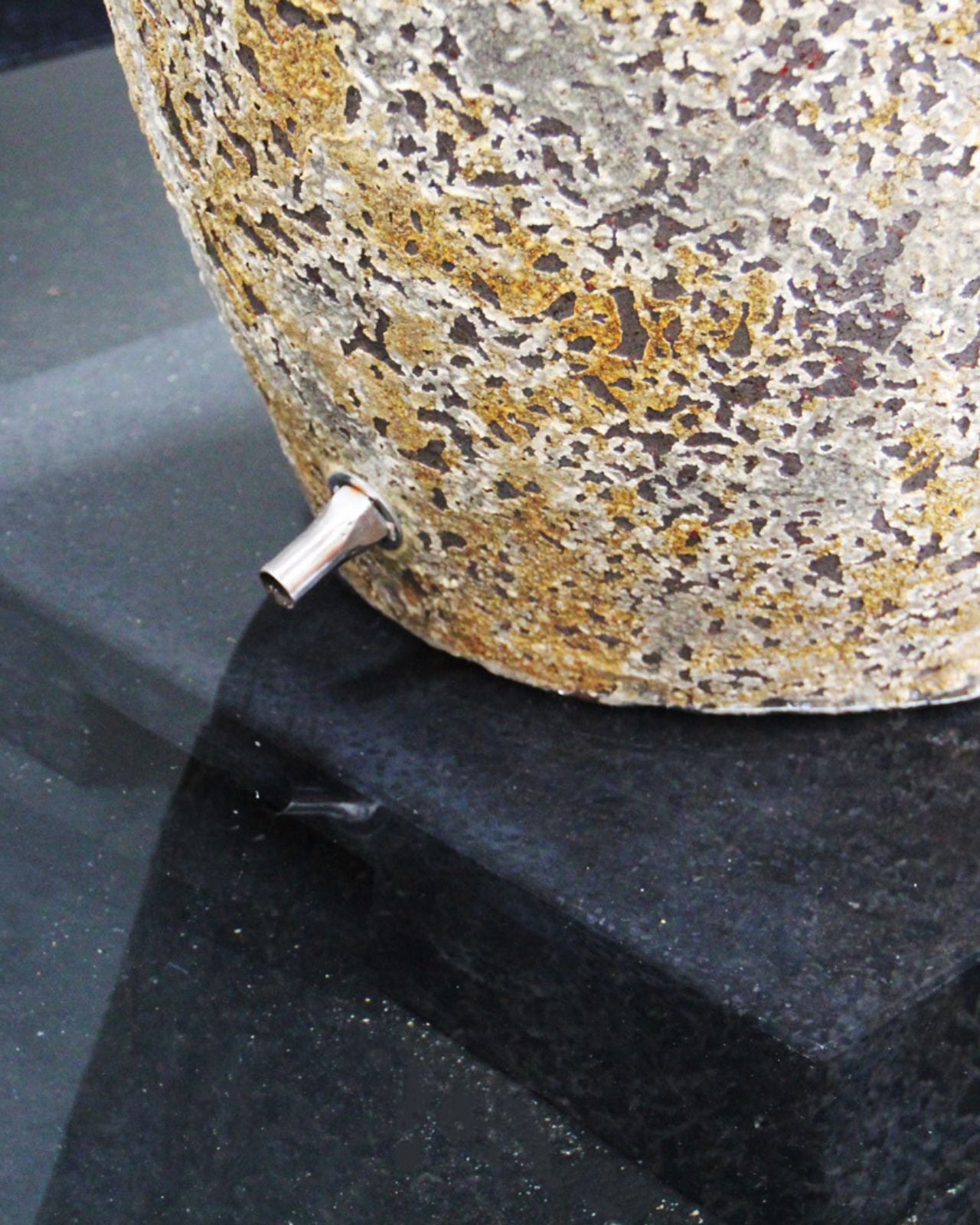
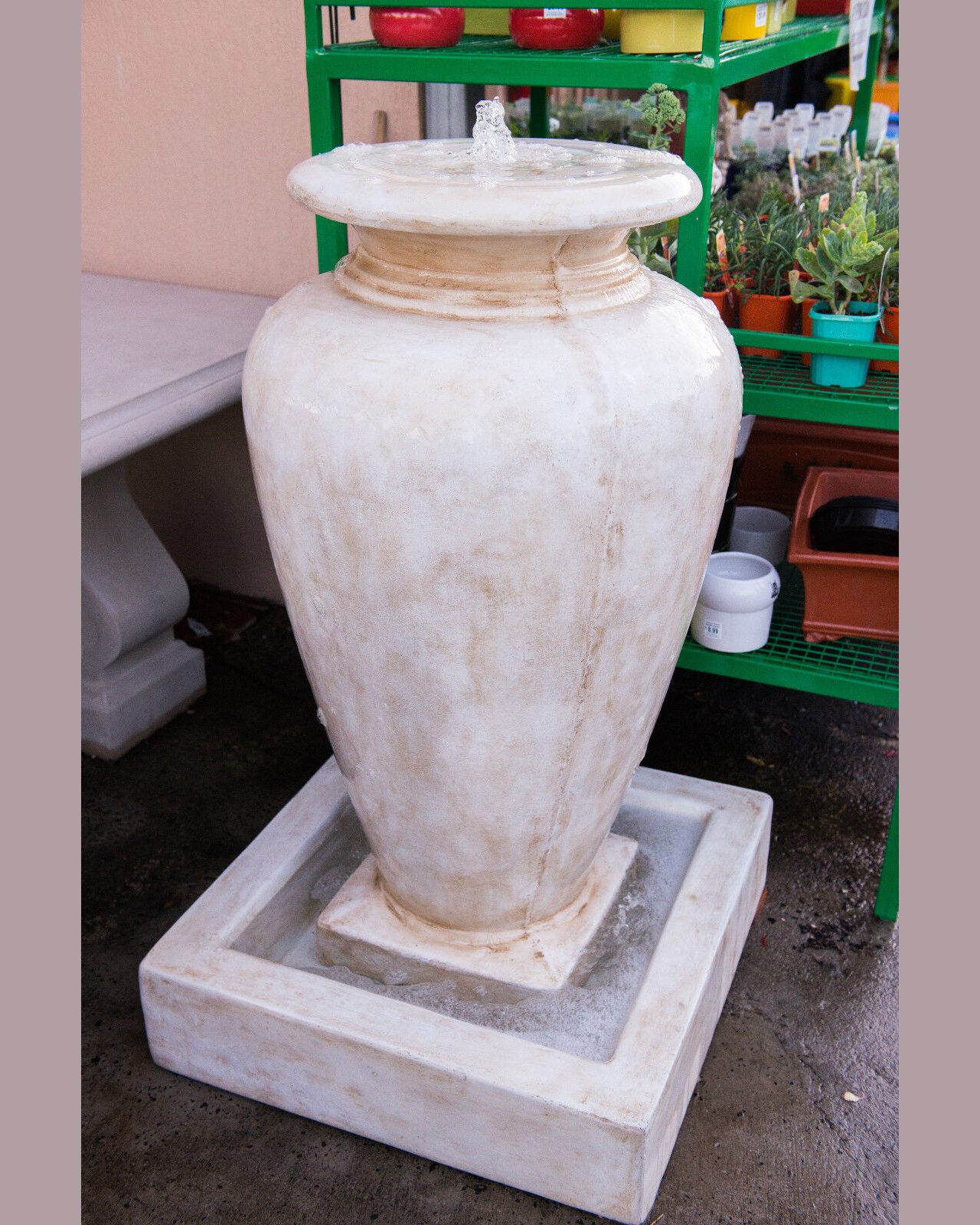

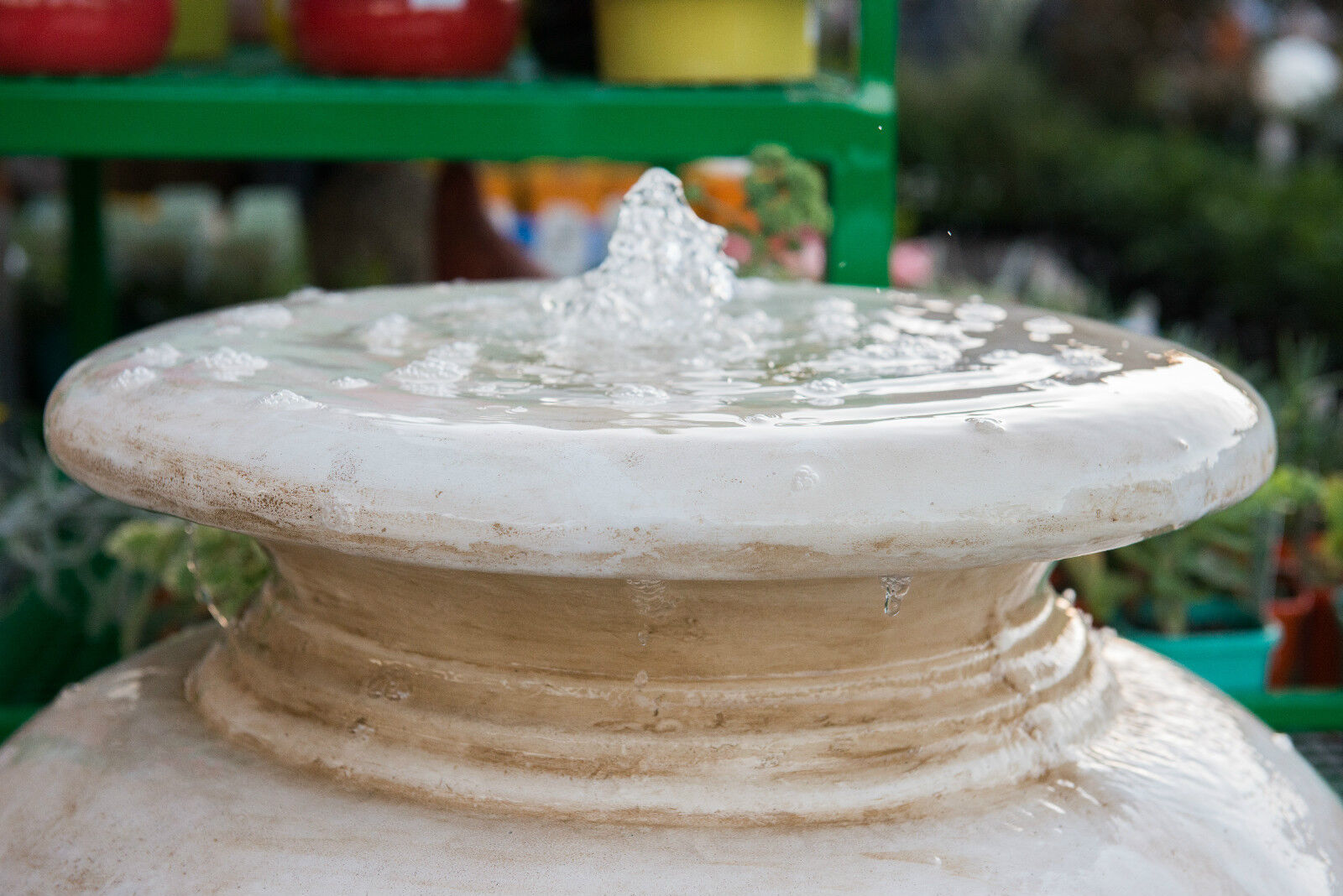
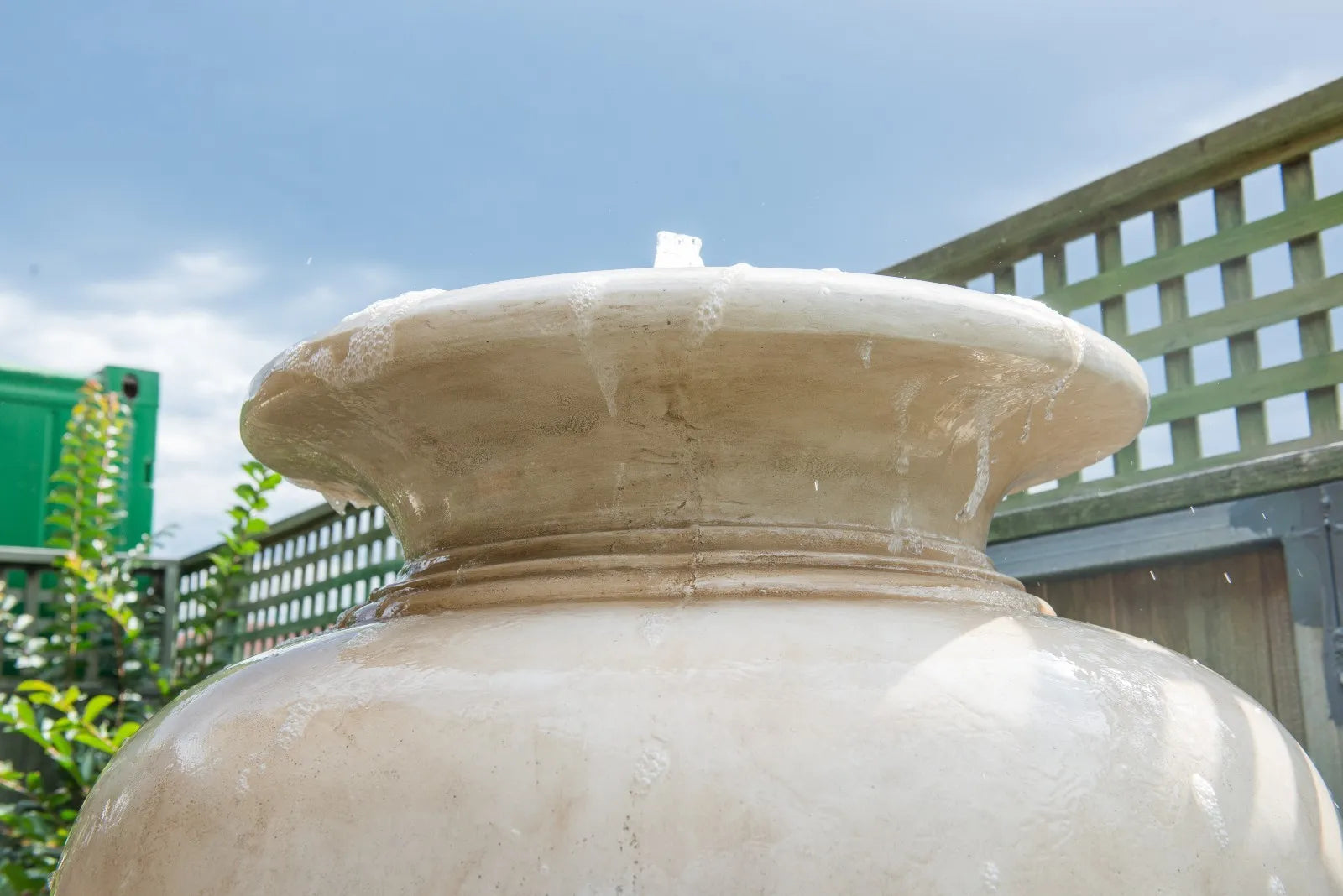
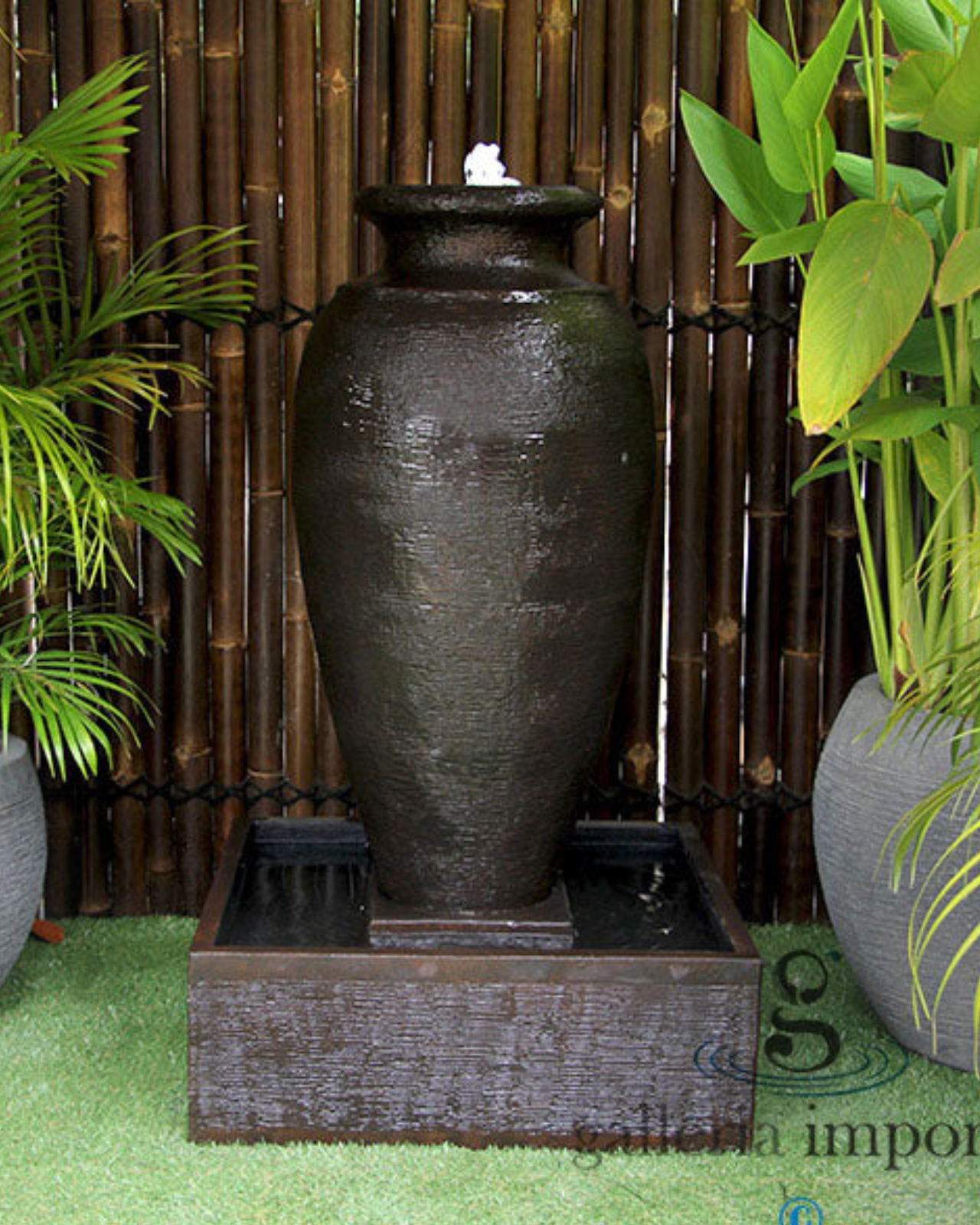

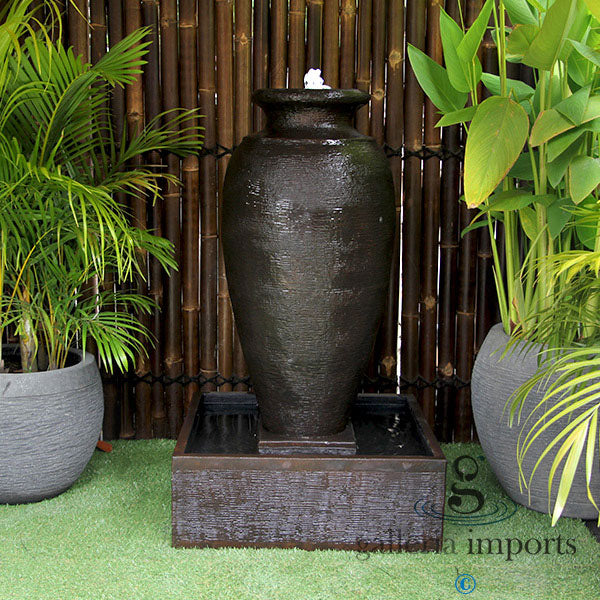
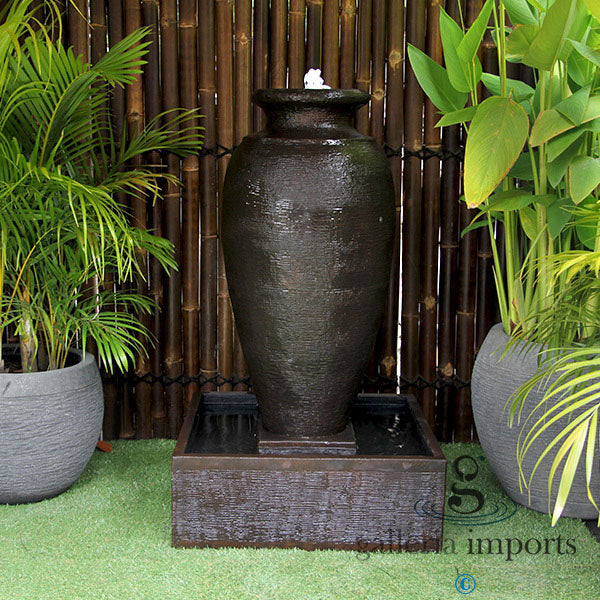
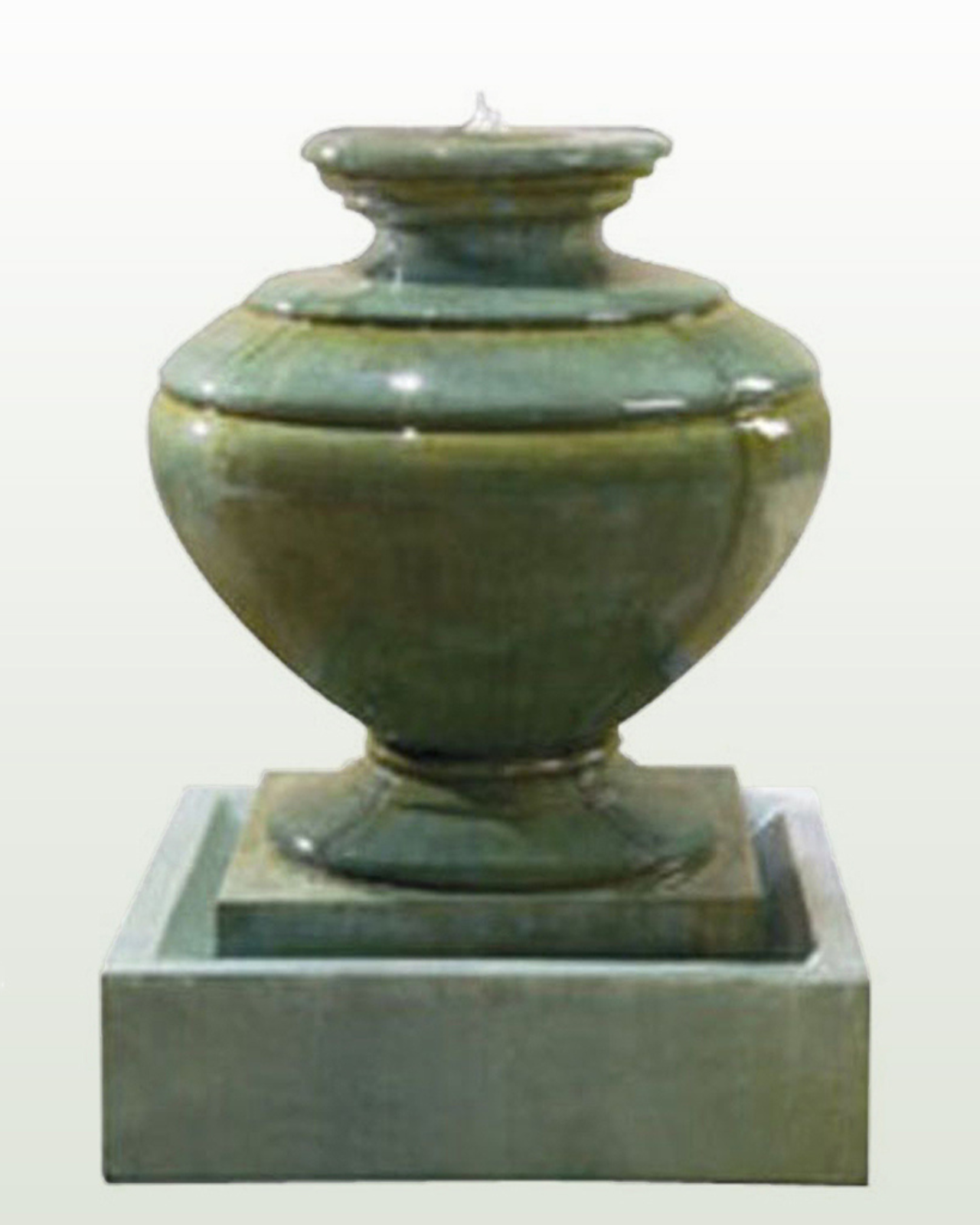
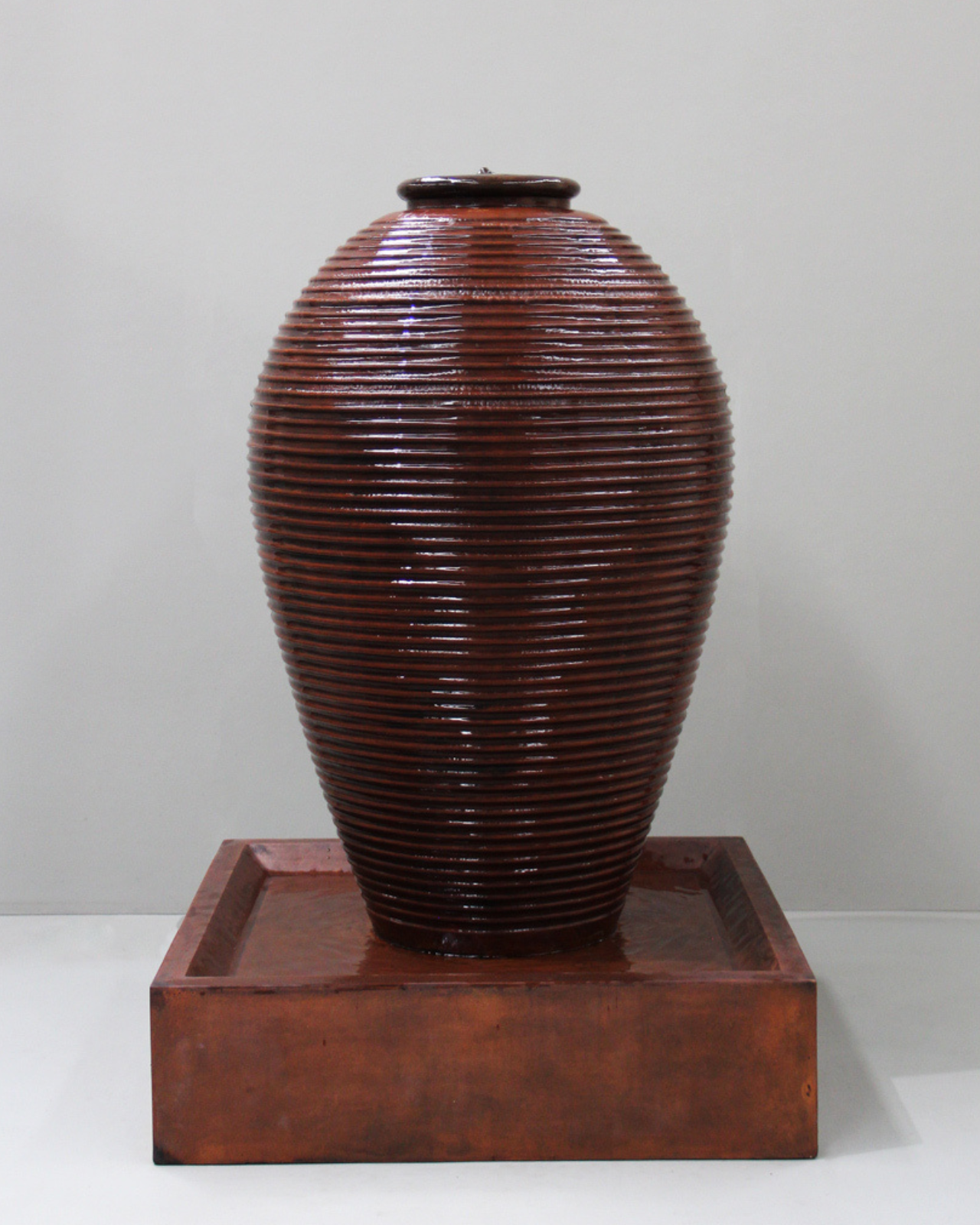
Share:
How to Choose the Right Pump for Your Water Feature?
Guide on Tiered Water Fountains